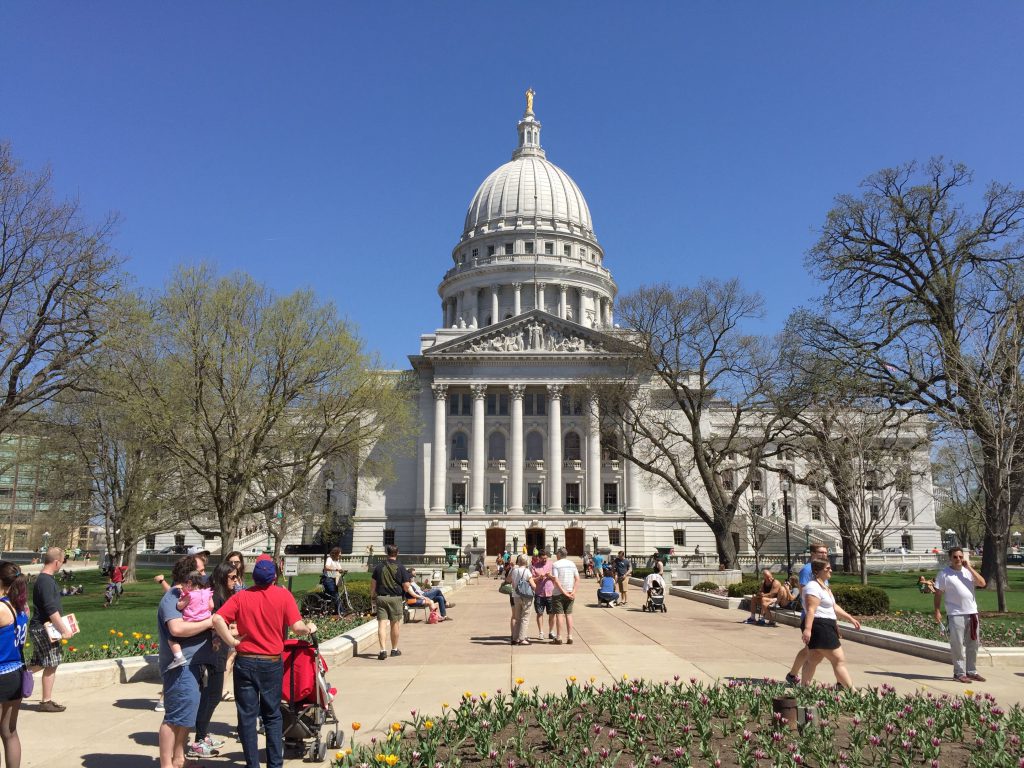State Faces April 16 Deadline for Medicaid Money
Legislature must amend lame duck law or lose hundreds of millions in federal funds.
Wisconsin faces a deadline of April 16 to qualify for hundreds of millions of dollars from federal Medicaid funding. Almost all of the other states have already qualified for the funding, and they have typically done so by executive branch action.
In Wisconsin, however, legislators and Governor Scott Walker severely restricted the Evers administration’s ability to respond quickly to emergencies when they hurriedly passed a bill in December 2018 that sharply reduces the power of the executive branch. That bill, which became Act 370, is sometimes referred to as the “lame duck” law because it was passed during a lame duck session, which is a meeting of the Legislature between the November general election and the swearing in of newly-elected lawmakers.
A bill approved by Congress a few weeks ago enables states to receive billions of dollars of increased federal Medicaid funding if they meet certain conditions for eligibility by April 16. Thanks to the lame duck law, Wisconsin might become the only state that fails to qualify for the sharp increase in federal assistance – if the Legislature does not pass a bill by April 16 enabling the Department of Health Services (DHS) to make a couple of minor Medicaid changes and to apply for the enhanced federal funds. That could cost the state about $50 million for each month of the year in which the national emergency is in effect.
Because of the urgency of the COVID-19 pandemic, the Trump administration has given states a quick and easy process for getting federal waivers of Medicaid regulations that impede access to health services or adopting more efficient enrollment processes. As of Friday April 3rd, 45 states had taken advantage of that option for making Medicaid a stronger tool for protecting their residents, but in our state utilizing the expedited federal process is anything but quick and easy. Although the Evers administration has developed a comprehensive waiver proposal to make Medicaid more flexible and effective during the current crisis, they cannot submit it unless the Legislature meets and explicitly allows the proposed changes or suspends the lame duck law.
Act 70, pushed through the Legislature in just a couple of days, blocks the ability of the Evers administration to act quickly during emergencies. The law not only requires Medicaid changes to be explicitly authorized by statute, but also creates a cumbersome multi-stage process after that, which includes several different opportunities for the Joint Finance Committee to review and sign off on the changes.
Act 370 was rushed to passage despite widespread opposition. The opponents included a included a broad coalition of the major health care providers who warned that the proposed law could have ‘unintended consequences.”
The lame-duck bill caused a 180-degree shift from the approach that the Legislature took in 2011 during Governor Walker’s first year in office. The budget bill enacted that year granted the DHS Secretary unprecedented authority to make sweeping changes in Medicaid policy, even if those changes conflicted with state statutes or administrative rules. It was almost a total transfer of legislative authority to set Medicaid policy. But after Tony Evers was elected, the same legislators thought that the role of the executive branch should be the opposite of the sweeping authority given to the Walker administration.
If the Legislature fails to act — and it must act quickly — Medicaid will be a much weaker tool in Wisconsin as health care providers battle the pandemic. In addition, failing to pass a bill by April 16 would cost our state hundreds of millions of dollars of federal funds that will be urgently needed in the months ahead. Act 370 is playing out as many opponents cautioned, and now the Legislature is the only body that can make sure Wisconsin has the resources it needs.
Legislation Link - Urban Milwaukee members see direct links to legislation mentioned in this article. Join today
More about the Lame Duck Laws
- Supreme Court Hears Case on Legislature’s Power - Sarah Lehr - Apr 3rd, 2025
- Four Years Later, State’s Lame Duck Law Still Faces Court Challenge - Shawn Johnson - Jan 17th, 2023
- Judge Rules Against Law Giving Legislators Power Over Attorney General Settlements - Shawn Johnson - May 11th, 2022
- State Supreme Court Dismisses AG’s Lame-Duck Lawsuit - Ruth Conniff - Mar 25th, 2021
- Kaul Sues Legislature Over Lame Duck Laws - Melanie Conklin - Nov 24th, 2020
- AG Kaul Announces Legal Action to Allow DOJ to Again Enforce Wisconsin Laws Without Unconstitutional Legislative Interference - Josh Kaul - Nov 23rd, 2020
- Vos Thinks Lame-Duck Session Didn’t Go Far Enough - Melanie Conklin - Jul 31st, 2020
- The State of Politics: Court Rulings Against Evers Sow Confusion - Steven Walters - Jul 20th, 2020
- Court Tosses Dems’ Lame-Duck Suit - Laurel White - Jul 16th, 2020
- Op Ed: State High Court Nullifies 2018 Election - James Rowen - Jul 12th, 2020
Read more about Lame Duck Laws here
Wisconsin Budget
-
Charting The Racial Disparities In State’s Prisons
 Nov 28th, 2021 by Tamarine Cornelius
Nov 28th, 2021 by Tamarine Cornelius
-
State’s $1 Billion Tax Cut Leaves Out 49% of Taxpayers
 Sep 21st, 2021 by Tamarine Cornelius
Sep 21st, 2021 by Tamarine Cornelius
-
TANF Program Serves a Fraction of Poor Families
 Aug 30th, 2021 by Jon Peacock
Aug 30th, 2021 by Jon Peacock





















I hope that this issue is aired out very much in public. Vos and Fitzgerald’s trimming of the governor’s power must be on full display. This could cost our citizens, especially those who have been displaced from jobs.